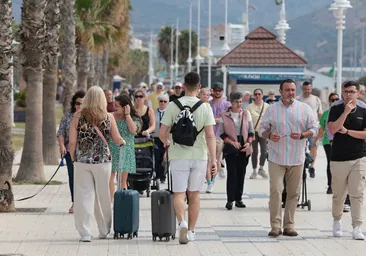Residents' groups in Spain will not be able to ban tourist apartments already registered
The clarification comes after the recent supreme court ruling upholding the measures introduced by some communities to stop the proliferation of holiday homes
Spain's Tribunal Supremo's (supreme court) rulings, which confirm that communities of residents can prohibit tourist accommodation with a majority of three-fifths of the owners' share quotas, settle an issue that until now has been hotly debated and has dragged on thanks to contradictory rulings in different provincial courts. However, these rulings have led to a more specific debate on the retroactive nature of any decisions taken by these communities. The supreme court advises that, in these first rulings that put a stop to the proliferation of holiday homes on housing developments and in residential buildings, "the Civil Chamber does not rule on retroactivity." They explain that the judges considering these two cases limited themselves to focusing on what the horizontal property law (LPH in Spanish) says in article 17.12 introduced by a royal decree of 2019. In this article it is established that the agreements will not be retroactive and so they advise that the object of these two appeals was whether the power of the communities to "limit and condition" supposes the prohibition (maximum limitation) of this activity, recalling that the precept establishes that "the agreement by which the exercise of the activity is limited or conditioned (....) shall require the favourable vote of three fifths of the total number of owners who, in turn, represent three fifths of the participation quotas." This rules out the interpretations that have been defending the idea that an authorisation to sanction must be unanimous.
Legal experts consulted point out that any prohibitions agreed to during full meetings of communities of residents cannot be retrospectively applied because this is what the LPH included in its 2019 update. In other words, any community agreement to ban tourist apartment applications will only be able to affect newly-registered tourist apartments, not those already registered.
It is worth remembering that the province of Malaga currently has 41,038 holiday homes available, which is just over double the number officially on the register with the Junta's 'turismo' department for the whole of Andalucía. Of these, more than 8,000 are concentrated in the capital of the Costa del Sol, where Malaga council has been the first to establish limits to the number of such properties, stating that only those with an independent entrance and their own water, electricity and heating services can be holiday homes. This resolution is based on the new Andalusian decree that regulates this activity, giving the affected municipalities the tools they need to curb the growth of this type of accommodation. As a result of this first limitation, the list of apartments that the city council is asking the Junta to cancel now exceeds 1,500. All this is happening in the context of a housing crisis caused by the shortage of housing and the high prices of properties both to rent and to buy.
In fact, the Sala Civil (civil chamber) of the supreme court also addressed this issue and explicitly states that "the will of the legislator is in favour of residential rental as opposed to tourist rental, which is intended to be restricted with the aim of increasing the stock of housing for rental, with the natural repercussion on prices and the correlative reduction in the effort of family economies. Conditioning or restricting the exercise of that activity does not solve, at least to the same extent, the problem of the difficulties of access to housing, which it is intended to correct by means of such a regulatory provision."
These rulings, which establish jurisprudence by being the first to conclude that "the attribution of this power of prohibition with the reinforced majority is a measure proportionate to the conflicting interests", emphasising that if this double majority of three-fifths were not admitted, the dissenting vote of the flat owner seeking to set up a holiday rental would be sufficient to prevent the ban. This judgement has been widely applauded by property administrators. Manuel Jiménez Caro, president of the Colegio Oficial de Administradores de Fincas in Malaga, the official organisation that brings together professional administrators who deal with the paperwork for communities of owners, emphasised that "at last a single criterion is established on the different interpretations that were being made depending on which provincial courts were dealing with whether the law only allows limiting or conditioning, but not prohibiting tourist homes with three-fifths of the share of the property." He continued: "It is now clear that prohibition is permitted and can be done under the provisions of the Horizontal Property Law." He further expresses his satisfaction at the "legal certainty it gives to the communities that had opted to go to court." Jiménez insisted on the importance of these supreme court rulings: "they are key and we should feel very satisfied that the supreme court has clarified the situation." Regarding whether residents' communities can retrospectively ban tourist apartments already registered following these rulings, he considers that "there is no retroactivity."
Reactions
In the same vein, the Andalusian council of property administrators (Cafincas) welcomes the two rulings from the Tribunal Supremo. As its president, Mercedes Romero, said: "a decision that has been awaited and demanded" by property administrators and it will "give legal certainty and settle the agreements on the permitting of tourist activity" in residents' communities throughout the country. She explains that "it is the first time that the highest court has ruled on the interpretation and application of article 17.12 of the Horizontal Property Law introduced by Royal Decree-Law 7/2019 of 1 March", and "the statutory prohibition on the rental of properties for tourist use has been ruled and underlines that the prohibition of the use of private elements in the horizontal property regime is legitimate and in accordance with the Constitution."
Finally, she reminded that in these rulings the supreme court "has taken a position on the expression 'limit or condition' which establishes that, according to grammatical, semantic and literal criteria, the term 'limit' does not exclude prohibition, a conclusion that justifies the adoption of urgent measures in the difficulties of access to rental housing due to the increase in rents due, among others, to tourist rentals."
For his part, Juan Cubo as president of AVVA-Pro (the Andalusian association of holiday rental professionals) pointed out that "as it could not be otherwise, we receive and accept with total normality the ruling which establishes that a community may prohibit the rental of tourist homes by a majority of three-fifths of the owners." Cubo emphasised that the supreme court "does not establish anything regarding the retroactivity of the rule, so we believe that the general principles of our legal system will apply, which establish that retroactivity can only be applied exceptionally and is prohibited in the case of punitive provisions or with unfavourable effects for those affected, as would be the case here." In this sense, he insists that "it is essential to guarantee legal certainty and protection of the legitimate interests of the owners who have been carrying out the activity prior to this ruling, and therefore the continuity of these accommodation places."
Cubo stressed that this accommodation offering "is strategic, firstly for the sustainability of the tourism sector in our community and, secondly, even more so for the rest of the economic sectors that benefit from the visitors who choose this type of accommodation for their holidays."


